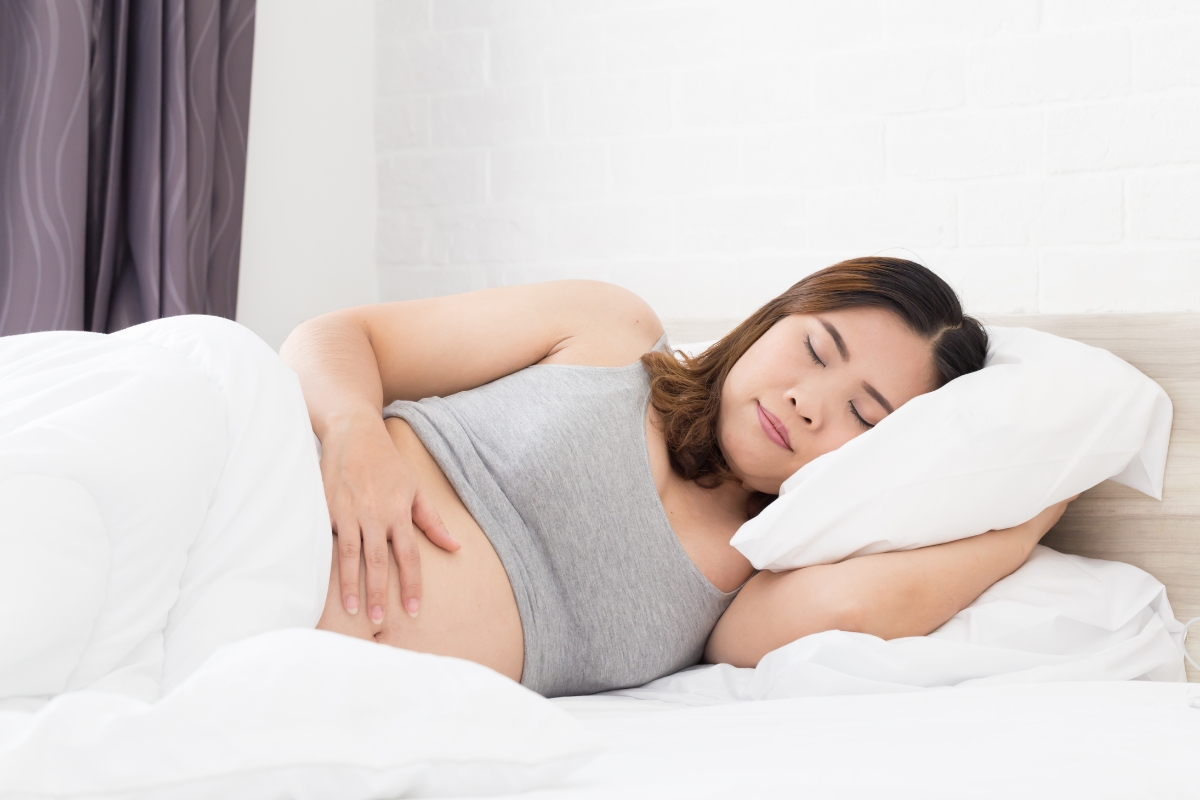If you’ve noticed yourself snoring while pregnant, you’re not alone. Snoring is a common symptom during pregnancy, particularly in the third trimester. As your body undergoes changes to support your growing baby, factors like increased blood flow, hormonal shifts and weight gain can all contribute to snoring.
While occasional snoring is common and usually harmless during pregnancy, if your snoring becomes louder or more frequent, it might indicate an underlying issue, such as obstructive sleep apnoea (OSA). It’s always a good idea to monitor your symptoms and speak to a healthcare professional if you’re concerned, so they can help determine the best course of action. Now, let’s take a closer look at the causes of snoring while pregnant and how you can manage it.
Understanding why snoring occurs
During pregnancy, your body produces more blood to nourish your baby. This increase causes blood vessels to expand, leading to swollen nasal passages that can restrict airflow. As a result, you may find yourself breathing through your mouth at night, which increases the likelihood of snoring while pregnant.
Weight gain is another contributing factor. Many women experience an increase in fat deposits around the neck, which can put pressure on the airway and make it more likely to collapse during sleep. The position you sleep in can also play a role — laying on your back allows the tongue and throat muscles to relax further, making snoring worse.
The different types of snoring
Not all snoring is the same, and identifying the type of snoring you have can help you find the right solution.
Everyday snoring
If you snored occasionally before pregnancy but notice it’s becoming more frequent, you may be experiencing everyday snoring. This type of snoring is caused by the soft tissue at the back of the throat vibrating due to a narrowed, dehydrated airway. The Snoreeze Throat Spray or Oral Strips can help by lubricating and tightening the airway, reducing the vibrations that cause snoring.
Snoring with congestion
Many pregnant women experience nasal congestion due to hormonal changes and increased blood flow. If your nose feels blocked at night and you find yourself breathing through your mouth, you’re likely dealing with congestion-related snoring while pregnant. The Snoreeze Nasal Spray and Nasal Strips work to open up the nasal passages, helping you breathe more easily and reduce snoring.
Loud snoring and OSA
Loud, persistent snoring combined with gasping or choking sounds during sleep may indicate sleep apnoea. This condition occurs when the airway partially or fully collapses, temporarily stopping breathing. OSA has been linked to pregnancy complications such as high blood pressure and gestational diabetes, so it’s important to speak to your doctor if you suspect you have it. The Snoreeze Oral Device can help by holding the jaw in the right position to keep the airway open, reducing both snoring and OSA symptoms.
Managing snoring while pregnant
If you’re struggling with snoring while pregnant, making small adjustments to your sleep routine can help. Try sleeping on your side instead of your back to keep your airway open. Using a pregnancy pillow for support can make this position more comfortable. Staying hydrated, keeping your bedroom air moist with a humidifier and avoiding heavy meals before bed can also improve airflow.
For extra support, Snoreeze products are designed to target different types of snoring and can be safely used during pregnancy. By identifying your unique type of snoring while pregnant and using the right relief, you can enjoy a quieter, more restful night’s sleep. If your snoring is severe or accompanied by other symptoms, don’t hesitate to seek medical advice. A good night’s sleep is essential for both you and your baby.
Be sure to sign up for our newsletter to keep up to date with our latest products.

